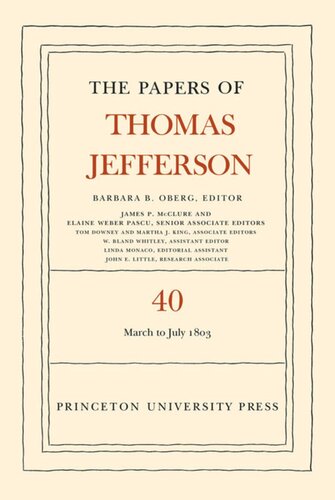

Most ebook files are in PDF format, so you can easily read them using various software such as Foxit Reader or directly on the Google Chrome browser.
Some ebook files are released by publishers in other formats such as .awz, .mobi, .epub, .fb2, etc. You may need to install specific software to read these formats on mobile/PC, such as Calibre.
Please read the tutorial at this link: https://ebookbell.com/faq
We offer FREE conversion to the popular formats you request; however, this may take some time. Therefore, right after payment, please email us, and we will try to provide the service as quickly as possible.
For some exceptional file formats or broken links (if any), please refrain from opening any disputes. Instead, email us first, and we will try to assist within a maximum of 6 hours.
EbookBell Team

5.0
100 reviewsThis volume opens on 4 March 1803, the first day of Jefferson's third year as president. Still shaken by the closing of the right of deposit at New Orleans, he confronts the potential political consequences of a cession of Louisiana to France that might result in a denial of American access to the Mississippi. But he resists pressures to seize New Orleans by force, urging patience instead. The cabinet determines in April that "all possible procrastinations" should be used in dealing with France, but that discussions with Great Britain move forward as well. In Paris, a treaty for the cession of the Louisiana Territory to the United States is signed, and in May the right of deposit is restored. On 3 July, word reaches Jefferson in Washington of the agreement that France has sold the entire Territory for $15 million. The glorious news, which may be the most momentous that Jefferson receives while president, appears in the National Intelligencer the following day. Having received congressional approval to send an expedition to locate a continental route to the Pacific, Jefferson drafts instructions and a cipher for Meriwether Lewis and arranges for the needed instruments. Following through on a promise to a friend to give his views of Christianity, Jefferson puts his religious creed on paper, a "Syllabus" of the morals of Jesus and the comparative merits of Christianity. He intends it only for a few trusted friends.